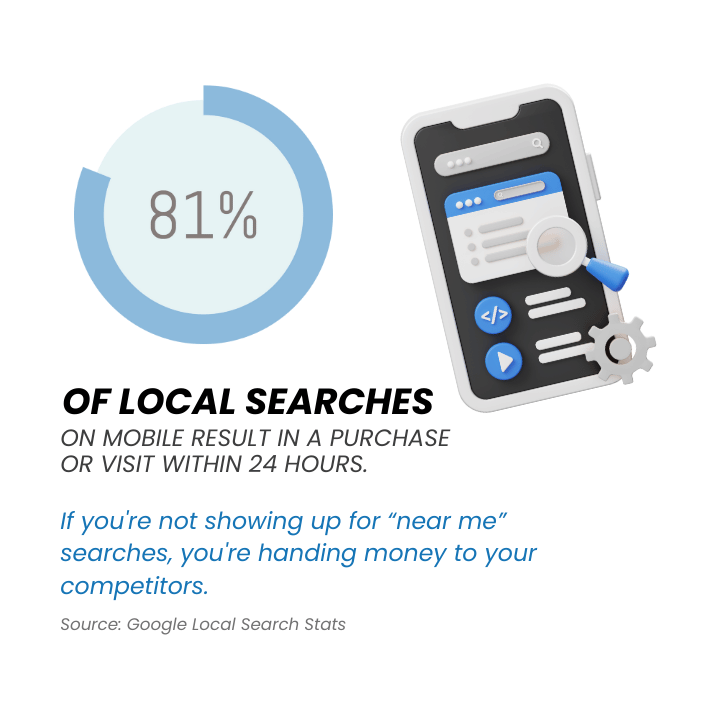Essential Google Maps SEO Practices for Business Owners
 Sebastian Sartele
Sebastian Sartele
How to Improve Your Local Ranking on Google
The challenge of standing out in local searches can be daunting when your online presence isn’t optimized for your community. Many local businesses struggle with low visibility and dwindling foot traffic despite offering exceptional products and services. This article details clear, actionable steps that can boost your local ranking on Google, helping you dominate the Google Maps pack and attract more nearby customers.
In this guide, you will learn proven techniques for optimizing your Google Business Profile, achieving consistent local citations, harnessing online reviews, refining your website with local signals, acquiring quality local backlinks, and monitoring user engagement. Each section provides real-world examples and data-driven insights from years of local search engine optimization experience.
Let’s examine how mastering your Google Business Profile and local citations can lay the foundation for improved rankings and increased customer engagement.
Master Your Google Business Profile for Better Google Maps Ranking
Optimizing your Google Business Profile (GBP) is the cornerstone of local SEO success. Google uses your profile to gather signals about your local authority, relevance, and proximity.
Every action taken to complete and optimize your listing directly influences your local search ranking.
Claim and Verify Your Google Business Profile Accurately
Claim your Google Business Profile and complete the verification process to confirm ownership. This step gives you access to useful features such as insights, posts, and customer review management. Verified businesses can see up to a 40% increase in local engagement.
Follow Google’s verification process carefully and double-check all details—business name, address, and other information—to avoid inconsistencies that may confuse search engine results page algorithms.
Complete Every Section of Your Google Business Profile Thoroughly
A comprehensive profile includes more than just basic business information. Fill out every available section—from descriptions and categories to operating hours and offered services.
Google rewards profiles that provide complete context, and businesses with detailed descriptions and regularly updated posts see up to 35% more clicks. A complete profile builds credibility with potential customers and helps Google better match your business with relevant search engine results page queries.
Select Precise Business Categories and Attributes
Choosing the correct business category and attributes is essential for clear communication with Google. Each category has specific ranking criteria that impact your visibility. For example, a restaurant selecting “Italian Restaurant” with attributes like “Family Friendly” or “Outdoor Seating” is more easily distinguished from competitors. Regularly review and update your categories in line with evolving trends and customer feedback to improve local search relevance.
Upload High-Quality Photos and Videos Regularly
Visual content is critical for engaging customers. Use high-quality photos and videos to enhance the visual appeal and trustworthiness of your listing. Listings with professionally shot images can receive up to 42% more clicks than those with generic visuals. Include images of your storefront, interior, staff, and key products to give potential customers an immediate feel for your local search environment.
Utilize Google Posts to Share Updates and Offers
Google Posts let you share offers, events, news updates, and product launches on your listing. Regular updates signal to Google that your business is active and engaged, which can improve engagement and ranking.
Use clear calls-to-action—like “Call Today for a 20% Discount!”—to prompt customer interactions and drive immediate action.
Build Consistent Local Citations for Stronger Google Maps SEO
Local citations are online mentions of your business’s Name, Address, and Phone number (NAP) on various directories and websites.
Consistent and accurate citations are critical to building trust with Google regarding your local search reliability.
Understand the Role of NAP Consistency in Google Maps SEO
Consistency in your NAP data across all platforms is vital. Even a 5% inconsistency can lead to a 10–15% drop in local search performance.
Always verify that your business details remain identical on your website, directories, and any citation sources. A structured, uniform format boosts your local ranking signals.
Identify Key Local Citation Sources for Your Industry
Not all citations are equal. Focus on high-authority, industry-relevant directories such as Yelp, Yellow Pages, TripAdvisor, Chamber of Commerce sites, and specialized industry directories. Listing your business on these platforms and local community sites helps build cumulative credibility and drives organic local traffic and improves local search.
Audit Existing Citations for Accuracy and Completeness
Conduct regular audits using tools like Moz Local or BrightLocal to ensure every citation is accurate and up-to-date.
Correction of any discrepancies in information helps maintain your local search strength and prevents negative impacts on your Google Maps ranking.
Develop a Strategy for Acquiring New Quality Citations
Build a proactive strategy for securing quality citations by targeting niche directories, local news outlets, and community websites.
Outreach efforts via email campaigns or partnerships with local influencers can lead to authoritative citations that signal to Google your status as a trusted local entity in local search.
Manage and Update Citations Over Time
Once citations are in place, ongoing management is essential. Regularly review and update these listings to reflect any changes in your business operations.
A schedule of quarterly audits ensures accuracy and reinforces Google’s trust in your search engine optimization profile.
Cultivate Positive Online Reviews to Rank Higher on Google Maps
Online reviews serve as powerful trust signals in local search. Positive reviews boost both credibility and attractiveness to potential customers while influencing your Google Maps ranking.
Encourage Satisfied Customers to Leave Google Reviews
Promptly ask satisfied customers for reviews after a successful transaction. A high volume of positive reviews can improve your local ranking by up to 25% compared to competitors with fewer reviews.
Personalize requests via follow-up emails or QR codes on receipts, and consider offering incentives like discounts to encourage more search engine optimization feedback.
Respond Professionally to All Reviews Both Positive and Negative
Engage consistently with all reviews—responding politely to positive feedback and addressing negative feedback with professionalism.
A calm, solution-oriented approach not only helps preserve your reputation but also signals to search engines that your business is committed to customer service. Active review management is linked to stronger local rankings.
Monitor Review Velocity and Sentiment
Keep track of how frequently reviews are posted and their overall tone. Sudden changes in sentiment or a surge of negative reviews should prompt immediate investigation.
Using review monitoring tools can help maintain a positive digital presence while signaling to Google that your standards are consistently met.
Address Customer Concerns Raised in Reviews Promptly
Respond promptly to customer concerns in reviews. Quick, genuine responses can turn a negative experience into a positive one and improve public perception.
Studies show that businesses addressing concerns within 48 hours gain higher trust scores, thereby indirectly boosting local search.
Integrate Review Signals Into Your Google Maps SEO Strategy
Add insights from reviews into your overall strategy.
If reviews commonly highlight excellent customer service, consider emphasizing this in your Google Posts and on your website.
Integrating review signals creates a cycle of enhanced visibility and customer engagement that benefits long-term local search SEO
Optimize Your Website With Local SEO Signals for Google Maps
Your website is a foundation for your local online presence and must be optimized with specific local signals to support your Google Maps ranking.
Incorporate Location-Specific Keywords Naturally on Your Site
Optimize your website’s content by naturally weaving in location-specific keywords. Phrases such as “Miami plumber,” “Gainesville dentist,” or “Coral Gables restaurant” appear in meta tags, headers, and image alt text to clearly indicate your geographic focus. Balance keyword usage to maintain readability and improve local search relevance.
Create Dedicated Location Pages for Each Business Address
If you operate in multiple areas, create dedicated landing pages for each address. These pages should feature local testimonials, maps, landmarks, and clear calls-to-action. Regular updates such as events or promotions on these pages further boost local search and drive traffic.
Ensure Your Website Is Mobile-Friendly and Loads Quickly
Given that many local searches originate on mobile devices, ensure that your website is optimized for speed and responsiveness. Mobile-first indexing by Google makes this crucial; a fast, accessible website reduces bounce rates and positively impacts search rankings.
Implement Local Business Schema Markup Correctly
Use Local Business Schema Markup to provide clear, structured data about your business, including NAP details, operating hours, and services. Rich snippets generated from schema markup improve the appearance of your listing in search results and enhance its clickability.
Improve Internal Linking to Local Content
Use internal links to connect related local content across your website. Linking between blog posts, testimonials, service pages, and location pages helps search engines understand your site structure, reinforces the local context, and improves user experience. Search engine optimization .
Acquire Quality Local Backlinks to Boost Google Maps SEO Authority
Local backlinks from reputable sources signal to Google that trusted local entities endorse your business, enhancing your SEO authority.
Identify Local Link Building Opportunities
Identify and target local websites, blogs, and directory sites with high domain authority that are relevant to your industry. Use tools like SEMrush or Moz to create a targeted list, and focus on obtaining backlinks from respected local sources through link building.
Engage With Local Community Organizations and Events
Participate in local events and collaborate with community organizations. Sponsoring sports teams, charitable events, or festivals often results in natural backlinks from event websites and local news outlets, enhancing your credibility with Google.
Sponsor Local Teams or Initiatives for Web Mentions
Sponsorship agreements typically include online mentions and backlinks from the sponsor’s website. These partnerships provide community-centric signals that reinforce your role as part of the local ecosystem and boost your local search profile.
Guest Post on Relevant Local Blogs and Publications
Contribute high-quality guest posts to local blogs, news websites, or industry publications. These posts not only build credible backlinks but also expose your brand to a wider local audience, reinforcing your authority as a search engine optimization thought leader.
Seek Mentions From Local Business Associations
Join local business associations that feature member directories or news sections. Regular mentions and backlinks from these associations help strengthen your domain authority and improve your local search performance.
Monitor User Engagement Signals for Improved Google Maps Ranking
User engagement metrics such as click-through rates (CTR), direction requests, phone calls, and interactions provide valuable insight into the performance of your Google Maps listing.
Analyze Click-Through Rates From Google Maps Listings
Regularly monitor CTR data available through Google My Business insights. A higher CTR indicates that your title, description, and visuals effectively capture user attention. Use user behavior insights to tweak images, offers, and call-to-action elements to boost clicks.
Track Requests for Directions to Your Business
Direction requests are a direct sign of user intent and proximity. Monitor these requests to understand how well your online presence drives real-world visits. Targeted local promotions and clear display of address information can increase direction requests and improve overall local search performance.
Measure Phone Calls Originating From Your Google Maps Profile
Phone calls initiated from your listing are treated as direct conversions. Tracking these calls—and ensuring your phone number and call-to-action are optimized—helps measure the effectiveness of your listing. Use call tracking tools to adjust your strategy based on real customer engagement.
Assess User Interactions With Your Google Posts and Q&A
Engagement with Google Posts and the Q&A section offers direct signals of activity. Regular updates and active participation in Q&A not only boost local visibility but also enrich the user experience. Increased interactions indicate a vibrant, trustworthy business profile to both users and search engines.
Refine Your Google Maps SEO Based on Engagement Data
Combine insights from CTR, direction requests, phone calls, and user interactions to refine your local SEO strategy. Refresh outdated images, adjust business hours seasonally, or run local promotions based on performance trends to continuously optimize your local search.
Frequently Asked Questions
Q: How does verifying my Google Business Profile improve my local ranking? A: Verifying your profile confirms ownership and signals authenticity to Google, resulting in higher engagement and better local rankings.
Q: What steps can I take to ensure NAP consistency across the web? A: Use the same format for your business name, address, and phone number on every listing, and routinely audit your citations to correct any inconsistencies.
Q: How important are customer reviews for my Google Maps ranking? A: Reviews are critical as they build trust and signal active customer engagement. A high volume of positive reviews with timely responses can significantly boost your ranking.
Q: Why should I invest in creating dedicated location pages on my website? A: Dedicated pages allow targeted local keyword integration, provide specific information for each area, and help improve organic traffic and local relevance.
Q: How can local backlinks from community organizations boost my ranking? A: Backlinks from reputable local sources act as endorsements, increasing your domain authority and trust in the eyes of search engines, enhancing your search engine optimization.
Q: What role does user engagement such as phone calls and direction requests play in local SEO? A: These interactions are direct indicators of user intent and trust. High engagement signals that your listing effectively converts interest into action, positively impacting your ranking.
Q: How often should I update my Google Posts and review my profile for optimization? A: Update your Google Posts at least once a week and review your profile monthly to ensure all information is current and engaging.
Final Thoughts
Boosting your local ranking on Google requires a multi-faceted approach that includes optimizing your Google Business Profile, maintaining consistent local citations, leveraging positive customer reviews, and refining your website with local SEO signals. These interdependent strategies work together to create a strong, authoritative online presence that drives both online and offline traffic. By focusing on actionable insights and continuously monitoring engagement data, you can adjust your tactics to meet evolving search engine algorithms and customer behaviors—ultimately driving higher visibility, increased lead generation, and sustained revenue growth in your local market.


